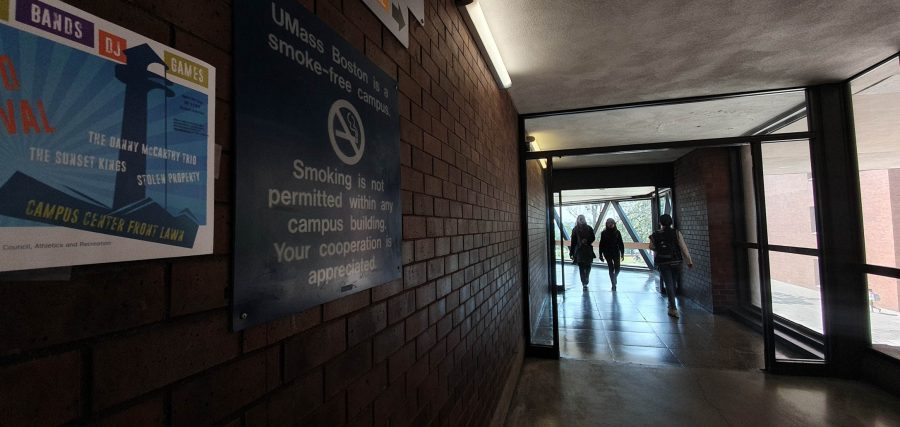UMass Boston has had a tobacco ban that’s been effective since January of 2016. Despite this, I have still seen many students smoking on campus. This is a serious issue for multiple reasons.
To go a bit more into the specifics: The ban applies to any and all tobacco and/or nicotine products. That means cigarettes, vaping, cigars, ingested tobacco products, etc. are all not allowed. The ban also applies to all grounds of the university (including the Bayside parking area), not just inside the buildings.
According to UMass Boston’s policy, the ban was created to “eliminate exposure to secondhand smoke, provide an environment supportive of tobacco-free lifestyles, mitigate the risk of accidental fire, eliminate the health risks associated with expectoration from smokeless tobacco, and eliminate the environmental impact of cigarette litter.” These are all realistic concerns. They are also things that people don’t think about often.
I’m a student with a disability. Part of my decision-making process while choosing this school had to do with the fact that it was supposedly a “smoke free” campus. This is very important for me, because I can go into anaphylaxis from being around cigarette smoke.
My first week on campus last year was fine. My second week involved me using five EpiPens, and needing to be brought into the ER twice. I no longer take classes on campus and have had to drop my minor due to it being unable to complete online.
There’s no words to fully describe the frustration of being unable to go into your class because someone is smoking outside of the doors, and unable to even ask the person to stop, since you can’t get close enough to them without risking your health/life to say it. Smoking doesn’t just impact the smoker.
It goes beyond rare cases like myself, though. The U.S. Surgeon General released a report in in 2014 with findings that around 2.5 million people have died due to exposure to second-hand smoke, between 1964 and 2014. That came to over 41,000 deaths a year. They also found that being exposed to second-hand smoke at work increases a person’s chance of developing heart disease by 25 to 30 percent. Meanwhile, the Institute of Medicine found that even brief exposure to second-hand smoke can trigger a heart attack and the American Cancer Society shares the fact that second-hand smoke contains a minimum of 70 chemicals that can cause cancer.
It impacts the general population. There is no safe, risk-free way to be around someone smoking. Just because the cigarette is not between your lips does not mean that you don’t receive consequences from the action. When you add in people with asthma, other lung diseases, autoimmune diseases etc., you can conclude that smoking is very dangerous to public health.
I’m aware that cigarettes can be an addiction. I know addicts…and I know people who aren’t addicts. I do not think it is okay to put the health and lives of others at risk though. There are places where you can smoke, and places that you can’t. UMass Boston is a place where you can’t. Please get help if you need it—and respect that rule.
Note: If you have an addiction, UMass Boston has a Recovery Support Program on campus. You can contact them by writing to [email protected] or going to www.umb.edu/recovery
(1) https://www.umb.edu/editor_uploads/images/life_on_campus/UMass_Boston_Tobacco_Policy.pdf
(2) U.S. Department of Health and Human Services. The Health Consequences of Smoking—50 Years of Progress: A Report of the Surgeon General. 2014.
(3) https://www.lung.org/stop-smoking/smoking-facts/health-effects-of-secondhand-smoke.html
(4)https://www.cdc.gov/tobacco/data_statistics/fact_sheets/secondhand_smoke/health_effects/index.htm
(5) https://www.cancer.org/cancer/cancer-causes/tobacco-and-cancer/secondhand-smoke.html
Why you need to follow the tobacco ban
September 12, 2019





















































